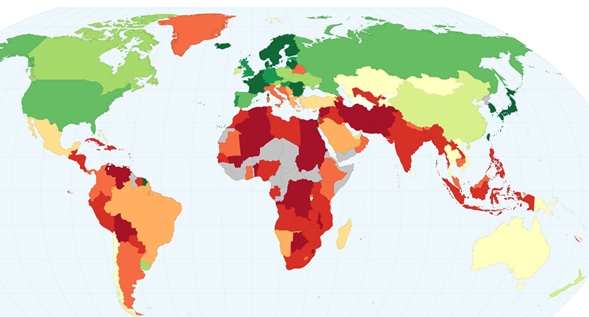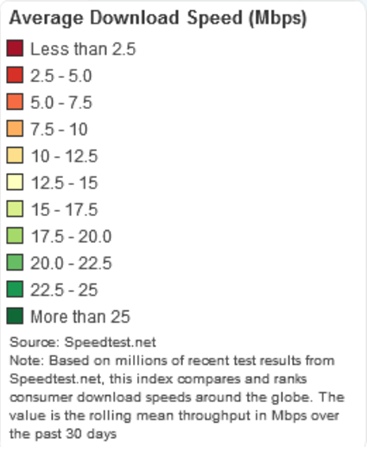Will China Compete with OneWeb and SpaceX for Global Satellite
Internet Domination?
by Blaine Curcio, Founder of Orbital Gateway Consulting
Up to this point, the overwhelming
majority of companies looking to launch LEO broadband satellite
constellations have come from the United States, and to some
extent Western Europe. This includes the two frontrunners—SpaceX
and OneWeb—as well as several other serious contenders for
regionally focused programs, or programs targeting specific
niches, i.e. Telesat, LeoSat, and in the longer-term,
potentially players like Boeing.
However, an emerging space power with
ambitions spanning launch, satellite manufacturing, further
development of its own space stations, and a plethora of other
aerospace industries, is likely to enter the LEO satellite
broadband race sooner rather than later. The emerging power I
refer to is, of course, China.


China’s space
program has evolved rapidly over the past few decades. As the
chart at right showing launches per year implies, China’s space
program as recently as the early 1970s was about as potent as
that of universities such as Caltech. How times have changed,
and China is now arguably the second-strongest space-faring
nation in the world behind only the United States.
The country has likewise developed a more
commercial attitude towards space. No longer simply a scientific
research field, the Chinese space industry has, over the past 12
months alone, sold (and also financed) communications satellites
worth hundreds of millions of USD each to, among others,
customers in
Nigeria,
Indonesia, and
Cambodia. These
GEO satellites are increasingly capable and the payloads are
increasingly large.
Mid-2017 saw China launch its first
high-throughput satellite (HTS).
Most notably for the LEO players, though, multiple Chinese
companies have announced plans for LEO broadband constellations,
begging the question of what might a world with a Chinese and a
US LEO broadband constellation look like?
China’s LEO Ambitions
Given that China’s CASIC and CASC (two
government-owned companies that combined are basically
combination of Boeing, Lockheed Martin, Northrop Grumman, and
NASA) have announced plans for a LEO broadband constellation
(link in Chinese), it appears clear that the government is in
favor of developing this technology. In addition, numerous
private companies, most notably Beijing Xinwei—a company best
known for having agreed to buy Israel’s Spacecom just weeks
before the latter company’s Amos-6 satellite blew up on the
launch pad—have announced plans for LEO broadband constellations
as well (though admittedly, this is likely more talk than action
at the moment). Like most major infrastructure projects coming
out of China today (lest we forget, Internet is also
infrastructure), these projects have a number of motivations,
including financial, geopolitical, technological, and possibly
psychological. Also like most major projects coming out of China
today, there is likely a fairly well-defined long-term plan,
even if that plan is not readily apparent right now. China’s LEO
constellation ambitions will likely involve the following:
·
Significant tie-in to One Belt, One
Road (OBOR). This highly nebulous phrase is used shockingly
frequently in Chinese media, conferences, and everyday
conversation. In short, it refers to a massive infrastructure
plan across much of Eurasia, however the program ultimately
appears open to basically any country except the US, Japan,
India, and a few other allies. OBOR has been used as
justification for many projects already, and it is likely that
any LEO constellation would have OBOR written all over it. An
article I published last year goes into more detail on China’s
OBOR ambitions as it pertains to space in general.
·
Significant degree of government
control. This may make it significantly more difficult for an
eventual “winner-take-all” scenario in terms of global LEO
broadband services. Even if, as I’ve speculated in this article,
SpaceX and OneWeb manage to have some sort of partnership, it’s
unlikely that the Chinese government would allow something as
sensitive as provision of Internet access involve a foreign
entity. China currently heavily censors its Internet, and it’s
unlikely to cede market access to western companies in this
industry. It should be noted that this is in sharp contrast to
the outcome in China’s ride-hailing wars, whereby Didi Chuxing,
China’s national champion, and Uber, the US’s national champion,
laid down their arms and agreed to cooperate rather than
continuing to burn through billions of dollars per year in
subsidies. Takeaway: ride-hailing is not as critical as
Internet.
·
A direct competition with SpaceX
and OneWeb? If China launches a LEO-HTS constellation, it will
almost by definition need to be more or less global in coverage,
this due to the nature of LEO orbit. Unless China plans on being
extraordinarily wasteful and simply utilizing capacity over
China while capacity over the other 96% of the earth’s surface
is idle, capacity will be sold abroad. If LEO broadband becomes
a viable way of connecting the unconnected, look to China to
move into many different markets selling this service. The most
obvious suspects would be OBOR countries. As the map below
shows, many of the countries that fall within OBOR’s scope are
the very same countries with poor Internet access. Deep-pocketed
China could see a compelling opportunity to provide a hugely
critical piece of infrastructure to countries that it is already
trying to bring into its orbit. What better way to become an
indispensable ally to a given developing country than to
 provide
Internet infrastructure to its unconnected? As anyone reading
this article can attest, once you’ve become accustomed to having
it, Internet is basically in the same league as food and water
as it pertains to daily necessities. Providing Internet to a
meaningful percentage of a population would put China in a very
strong position in many of these
provide
Internet infrastructure to its unconnected? As anyone reading
this article can attest, once you’ve become accustomed to having
it, Internet is basically in the same league as food and water
as it pertains to daily necessities. Providing Internet to a
meaningful percentage of a population would put China in a very
strong position in many of these
 countries,
and potentially enable them to control access to the Internet
for tens or hundreds of millions of people outside its borders
(which might be an appealing/subsidy-worthy goal in itself).
countries,
and potentially enable them to control access to the Internet
for tens or hundreds of millions of people outside its borders
(which might be an appealing/subsidy-worthy goal in itself).
Up to now, the LEO broadband constellation
plans coming out of China are decidedly more modest than those
of SpaceX and OneWeb, with China’s generally numbering in the
hundreds rather than 1000+ satellites. However, the rapid growth
in China’s space industry in general, and specifically in
manufacturing, launch, and HTS capabilities, mean that if LEO
broadband starts to look like a viable way to connect tens or
hundreds of millions of people, China would likely jump into the
ring. Under the guise of the country’s massive infrastructure
initiatives, there could be an aggressive land-grab phase for
market access across the developing world.
This should
be considered a warning to the SpaceX’s and OneWeb’s of the
world—this is a dangerous game to play. If the LEO broadband
business model fails spectacularly, then you lose. If LEO
broadband looks like a winner, then you will have precious
little time to establish a presence across a variety of markets,
before China Inc. comes knocking. Just ask Uber in their
secondary home turf, Mexico.


